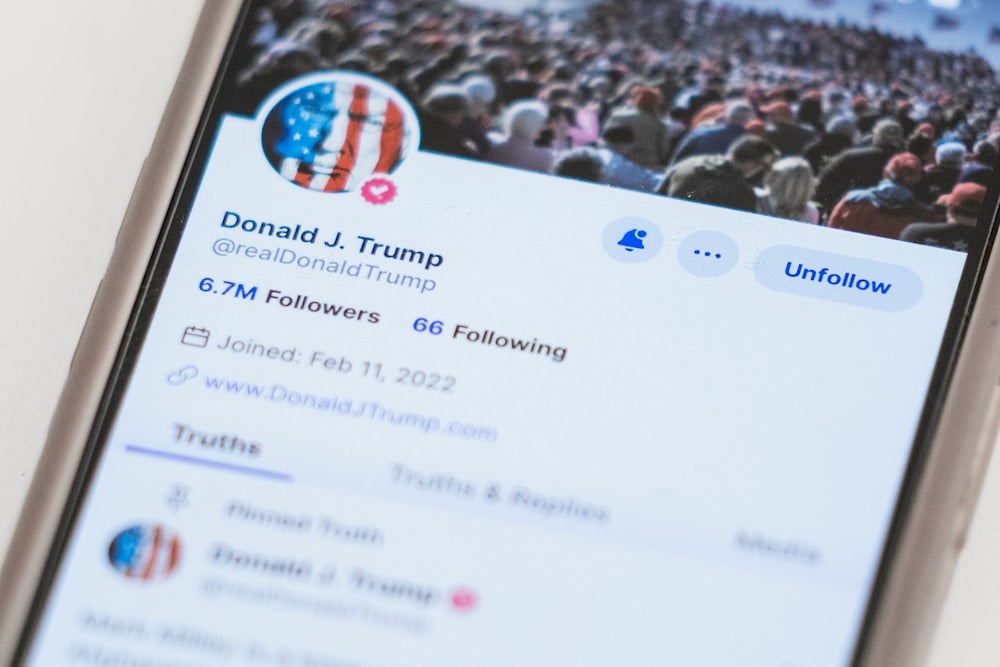Trump's social media posts become key factors in legal cases
Donald Trump's Truth Social posts are becoming central evidence in multiple legal challenges, including a Harvard lawsuit and a defamation case tied to writer E. Jean Carroll.
-

The Truth Social account for President Donald Trump is seen on a mobile device, March 20, 2024, in New York (AP)
Donald Trump’s social media posts have become a significant element in various legal cases filed against his administration, as institutions and law firms challenge his efforts to compel them to comply with his assertions of presidential authority, The Guardian reported on Saturday.
The president's hostile remarks about Harvard on his Truth Social platform, in which he called its professors "bird brains," are being cited by the university's lawyers as evidence that his efforts to reduce its funding and restrict its ability to enroll foreign students are motivated by personal animosity rather than valid policy reasons.
In a social media rant following Harvard's lawsuit to stop his administration's attempted $2.2 billion funding freeze, Trump lashed out at the world's wealthiest university, labeling it "an antisemitic, far left institution."
In the same post, Trump claimed the university admits students from "all over the world who want to rip our country apart," a statement that has gained new significance following his administration's recent attempt to block Harvard from enrolling international students.
Currently, these students make up 27% of its student body, with approximately 5,000 foreign scholars studying there, while also referring to some Harvard students as "crazed lunatics" who "spew fake anger and hate."
Deeo hostility toward Harvard
Last Sunday, after a judge prevented his administration from stripping Harvard's ability to admit international students, Trump insisted on obtaining the names and nationalities of all foreign students enrolled at the university, arguing it was a justified demand given the billions in funding the institution receives. Trump additionally accused Harvard of being deliberately uncooperative in providing this information.
On Thursday, lawyers representing Harvard cited the posts in their presentation to a Boston court, where Judge Allison Burroughs extended a temporary restraining order that had been issued the previous week to block the ban.
The Truth Social posts prove a deep hostility toward Harvard, and Harvard believes they also suggest that hostility is based on Harvard’s exercise of its First Amendment activity,” Georgetown Law Professor David Super told The New York Times, noting that Trump's social media posts helped Harvard.
In a particularly inflammatory post last month, Trump stated, "Harvard has been hiring almost all woke, Radical Left, idiots and ‘birdbrains’ who are only capable of teaching FAILURE to students and so-called ‘future leaders’," lashing out at the university's hiring practices and faculty.
Antisemitism accusations
Harvard, like many other universities, has faced accusations by pro-"Israel" officials not doing enough to address antisemitism amid campus protests sparked by "Israel's" war on Gaza.
The conflict escalated when Harvard's president, Alan Garber, refused to comply with administration demands for "reforms", which university leaders argued would compromise essential academic freedoms.
On Truth Social, Trump escalated his criticism by threatening to revoke Harvard's tax-exempt status, declaring in a post, "We are going to be taking away Harvard’s Tax Exempt Status. It’s what they deserve!" as part of his ongoing dispute with the university.
The move to restrict foreign student admissions, a key financial lifeline for universities, was unveiled last Friday by Homeland Security Secretary Kristi Noem, who criticized Harvard's administration for not adequately addressing what she described as widespread racial bias and anti-Jewish hostility on campus.
Additionally, she claimed the university's leadership previously engaged in coordinated activity with the "Chinese Community Party".
Trump's posts challenge his adminsitration
In a recent decision, Judge Beryl Howell referenced multiple social media posts in which Trump targeted the law firm Perkins Coie, using these statements as part of the justification for overturning his executive order that had revoked the firm's security clearances and barred its access to federal facilities.
Judge Howell noted that the executive order stood apart from those of past US presidents, observing that it seemed to follow a timeless strategy reminiscent of Shakespeare’s famous line about eliminating legal opposition first.
“Perkins Coie’s representation of President Trump’s political opponent in the 2016 presidential campaign and representation of other clients in connection with election litigation has drawn President Trump’s attention and ire, as reflected in his public statements," Judge Howell added.
Retaliatory intent
The intensity of Trump’s Truth Social posts drew scrutiny during last year’s campaign, as watchdog group Citizens for Responsibility and Ethics in Washington reviewed 13,000 messages and documented repeated threats, including one stating “IF YOU GO AFTER ME, I’M COMING AFTER YOU!”, which prosecutors later cited in legal filings as evidence of retaliatory intent against political rivals like Joe Biden.
Trump countered by arguing that his social media statements were being weaponized against him while he contested the Justice Department's probes into his involvement in the January 6 Capitol attack and his handling of classified materials.
Trump's aggressive posting loses him a case
His current wave of social media activity mirrors his behavior during last year's defamation trial involving writer E. Jean Carroll, which followed her successful sexual abuse lawsuit against him.
In the lead-up to his scheduled testimony, Trump intensified his online activity by sharing over 35 conservative media articles about Carroll, who was pursuing a defamation case against him for statements made during his presidency, while simultaneously targeting the presiding judge in his posts throughout eight hours.
During an earlier phase of the trial, Trump launched a barrage of more than 40 social media posts within a single hour, aggressively disputing Carroll's allegations, which ultimately led to her receiving an $83 million damages award in the defamation case.

 6 Min Read
6 Min Read








